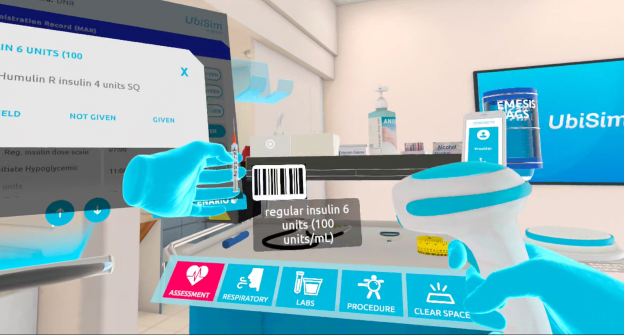Psychological Safety for Nursing Students in Immersive Virtual Reality

Table of Contents
Name of the heading 1
1- Start your table with the syntax {start-table}
2 - Add an H3 Heading to create a new column (this will be the column title)
3 - List cells as bullet points in a List element
4 - End your table with the syntax {end-table}
In the realm of immersive virtual reality for nurse education, psychological safety needs to take center stage, providing a secure haven for learners to embrace intense and realistic experiences such as a child having sepsis or a pregnant female with preeclampsia.
Discover how the crucial element of psychological safety unlocks the full potential of VR for nursing students, enabling them to practice clinical judgment and communication skills within the realms of the virtual world.
UbiSim, a virtual reality platform just for nurses, maintains psychological safety throughout the simulation, from the design of the scenario to the prebriefing, the VR session, and the debriefing.
What exactly is psychological safety in virtual reality?
Psychological safety in VR refers to the perception and experience of feeling safe, supported, and comfortable while engaging with virtual reality experiences. It encompasses the emotional well-being and sense of trust that individuals have within the virtual environment.
In VR, psychological safety is crucial due to the immersive nature of the technology. VR can create intense and realistic simulations that may trigger emotional responses or elicit a sense of vulnerability. Psychological safety ensures that users feel secure and protected while interacting with virtual environments, allowing them to fully immerse themselves and explore without fear of judgment, harm, or negative consequences.
Hear from nursing faculty about this concept, “They call it psychological safety now, meaning students feel comfortable in VR. When they don’t feel like they’re in an environment where they’re going to be judged by faculty or peers in class, and you make it a safe space, they really enjoy it.”
Ways UbiSim supports psychological safety
Scenario Design & VR Session
Scenario designers consider psychological safety when designing scenarios, ensuring that the learning objectives match the level of students who will be completing the scenario. We consider these two aspects in particular:
"Cognitive load: If participants feel they are being presented with too much information, this can create stress and potentially erode psychological safety. Processing too much information in less time leads to cognitive overload, thereby causing a stressful learning environment and reducing the learning outcomes. Simulation exercises should be designed in a way to avoid cognitive overload and therefore maximize learning and maintain psychological safety.”
- UbiSim scenarios are categorized into levels, aiming to match the learner's knowledge and skill level. For example, we have fundamentals as well as medical surgical.
"Fidelity: Fidelity in simulation is described as how accurately reality is represented. If the participants perceive there is an issue with fidelity, they are less likely to feel safe and may even be confused by the simulation. Medical simulations have three types of fidelity. They are physical (an approximation of senses like tactile, visual, olfactory, and auditory), conceptual (patient's physiologic, pharmacologic and emotional responses), and emotional/experiential fidelity (happiness, stress, anxiety).
Participants' perception of realism in simulation depends on these three kinds of fidelity. If there is an issue with any component of fidelity, it could affect the psychological safety of the learners. Participants' perception of realism, along with a fiction contract, decides their willingness and ability to engage.” [2]
- UbiSim immersive VR scenarios have physical fidelity (the patient and environment closely mirror real life), conceptual fidelity (designed by expert nurse educators so that the patient makes sense to the learners), and emotional/experiential fidelity (the learner feels present and the learner has emotions and feelings that they would in a real patient experience).
Pre-Briefing
This sets the stage for the experience and touches on psychological safety. Each scenario is designed following INACHSL standards of best practice, so if the facilitator follows those standards as well as the pre-briefing in the scenarios, psychological safety can be achieved. It does depend heavily on the facilitator setting the stage. However, UbiSim does provide the tools to assist with the process, such as the following prebrief.

Debriefing and Feedback
"Feedback: Giving and receiving feedback can be challenging. Maintaining psychological safety doesn't mean avoiding constructive feedback. Constructive feedback in moderation motivates learners to improve their skills. The feedback conversation should never be disrespectful. The main focus should be on things that can be improved and how they can be improved. A psychologically safe environment helps participants:
- Appreciate comprehensive feedback
- Have the willingness to reflect on problems and skills that are challenging
- Correct and repeat the actions until a level of consistency is achieved."
- UbiSim scenarios provide feedback that is worded in a way that encourages reflection, exploration of knowledge, and recognition of areas for improvement. Receiving purposeful session feedback, self-reflection with questions modeled after the PEARLS debriefing framework, quiz, and unfolding case study questions are all designed with psychological safety in mind.
Conclusion
UbiSim recognizes that psychological safety is crucial for nursing students to fully embrace VR simulations and develop clinical judgment and communication skills. By implementing strategies that foster psychological safety throughout the entire VR experience, UbiSim paves the way for effective and transformative nursing education.
Schedule a demo of UbiSim!
FAQs
Heading 1
Heading 2
Heading 3
Heading 4
Heading 5
Heading 6
Lorem ipsum dolor sit amet, consectetur adipiscing elit, sed do eiusmod tempor incididunt ut labore et dolore magna aliqua. Ut enim ad minim veniam, quis nostrud exercitation ullamco laboris nisi ut aliquip ex ea commodo consequat. Duis aute irure dolor in reprehenderit in voluptate velit esse cillum dolore eu fugiat nulla pariatur.
Block quote
Ordered list
- Item 1
- Item 2
- Item 3
Unordered list
- Item A
- Item B
- Item C
Bold text
Emphasis
Superscript
Subscript
Explore more

Mitigating Medication Administration Errors: VR Training for New Nurse Transition
Discover how VR simulation builds competency, reduces transition shock, and cuts turnover in nurse residency programs.

Why Academic-Practice Partnerships are the Future of Nursing
Learn how VR-enhanced Academic-Practice Partnerships eliminate transition shock, achieve 100% retention, and save health systems millions in turnover costs.

Beyond Pass Rates: Why Clinical Judgment Is the Measure of Nursing Readiness
Discover why clinical judgment, not just pass rates, indicates nursing workforce readiness. Learn how AI-enhanced VR simulation builds practice-ready graduates.

